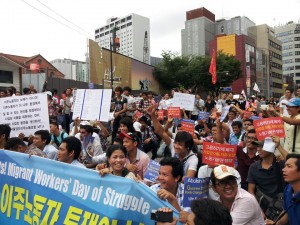Migrant Workers Stand up to new Slave Labor Policy
On June 4, 2012, the South Korean Ministry of Employment and Labor MoL) announced a new policy entitled "Policy for Improvement in Foreign Workers' Change of Workplaces and Prevention of Broker Intervention". This policy, which went into effect on August 1, changes the procedures used by local MoL job centers in processing migrant workers' applications to transfer workplaces. While the policy's title sounds good, it actually makes it incredibly difficult for migrant workers to change employers, even in cases where they face extremely severe labor rights violations and poor working conditions. The policy change has sparked severe concerns by migrant workers' advocates and the beginnings of a potentially powerful struggle based on the participation and leadership of migrant workers themselves.
Documented migrant workers in South Korea are regulated by the Employment Permit System .EPS). Under this system, migrant workers, who receive short-term residence permits, can change workplaces a limited number of times, but generally need the permission of their employers to do so. If a migrant worker who leaves one workplace cannot find new employment within three months he/she loses his/her residence status, becoming undocumented. Even without the new MoL policy, the limitations the EPS puts on changing workplaces means the workers are often stuck with abusive employers with no options except to endure the situation or leave the workplace without permission, thus becoming undocumented.
The new MoL policy makes the situation even worse. Whereas in the past, migrant workers seeking new employment were given a list of potential workplaces, now only employers receive a list of migrant workers looking for job. This means that migrant workers can do nothing more than sit at home hoping for a call from a prospective employer and will have a hard time refusing a job offer no matter how poor the working conditions for fear of not getting a second one. As such, the policy will further discourage migrant workers from leaving employer who violate the labor law in the first place, effectively forcing them into slave labor. The policy is a clear violation of the right to free choice of employment, guarantee in Korean labor law and ILO Convention 122, which South Korea has ratified.
Recognizing the problematic nature of this policy, the Migrants Trade Union, the Korean Confederation of Trade Unions and migrant worker support centers across the country formed a "Committee to Repeal the Slave Labor MoL Policy". This Committee has been actively fighting the policy since mid-July. Even more important, however, has been the massive participation of previously unorganized young migrant workers who, recognizing the significance of the policy for their daily lives, have started to come out to meeting and protests in force. Nearly 700 such workers, mostly from Cambodia, showed up at a rally on August 19, having seen advertisements for it on the internet or hearing about it by word of mouth. These workers held an impromptu discussion about what to do next at the rally site and then come out for a meeting the following weekend to discuss detailed plans. This level of voluntary participation by unorganized migrant workers is unheard of these days in the Korean migrant workers movements, which has been weekend over the last several years by massive immigration crackdowns and targeted repression.
The struggle against the MoL's new policy is significant for several reasons. First the policy represents a trend towards the increasing repression of migrant workers rights, even as the South Korean government and capital admit that migrant labor is essential to the Korean economy. Secondly, the struggle has brought together and energized organizations working on migrants rights around the country. Finally, and most importantly, this struggle presents a desperately needed organizing and leadership development opportunity. It will be up to union officers and activists to seize this rare chance to revitalized a migrant worker-led migrant rights movement.
